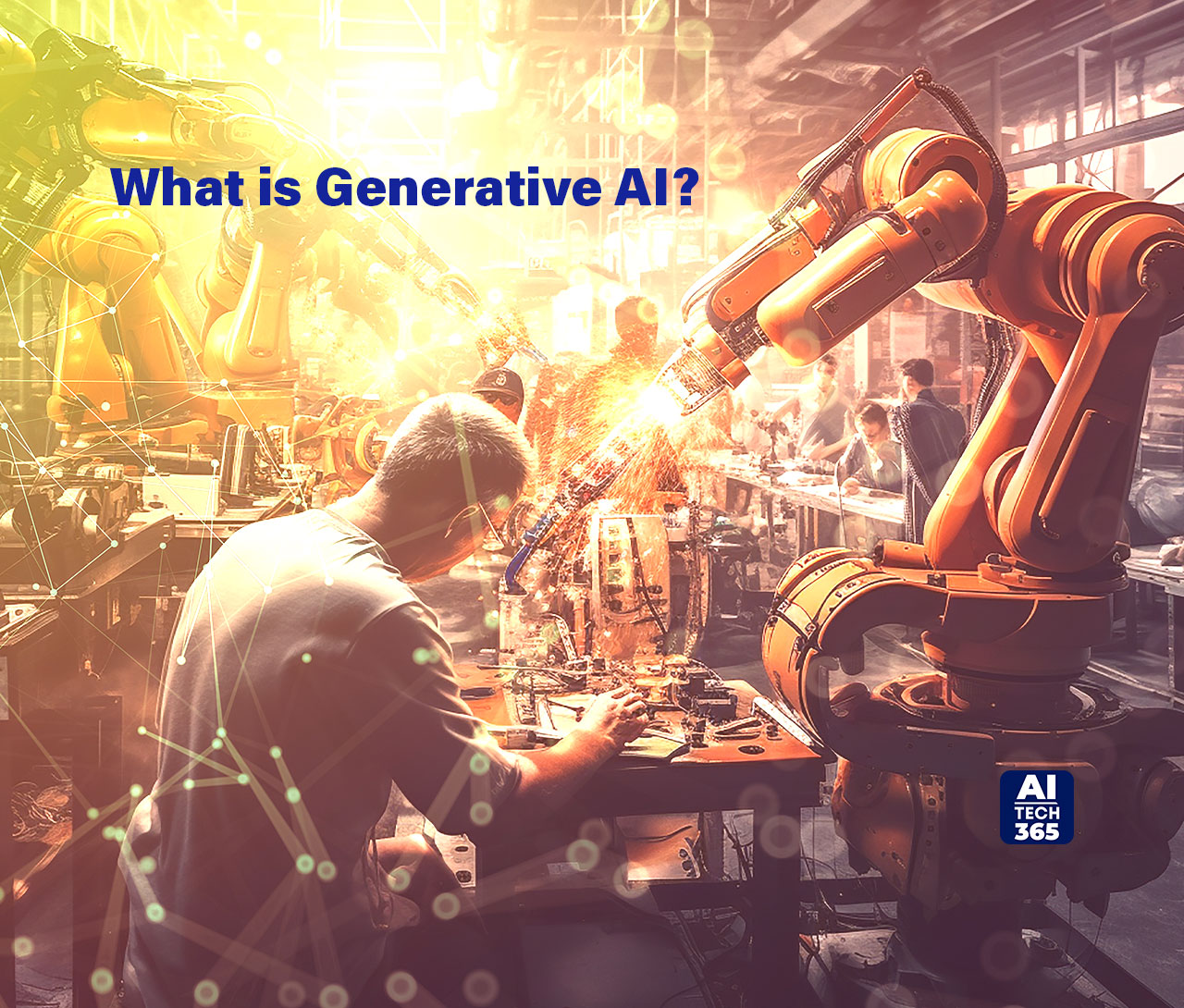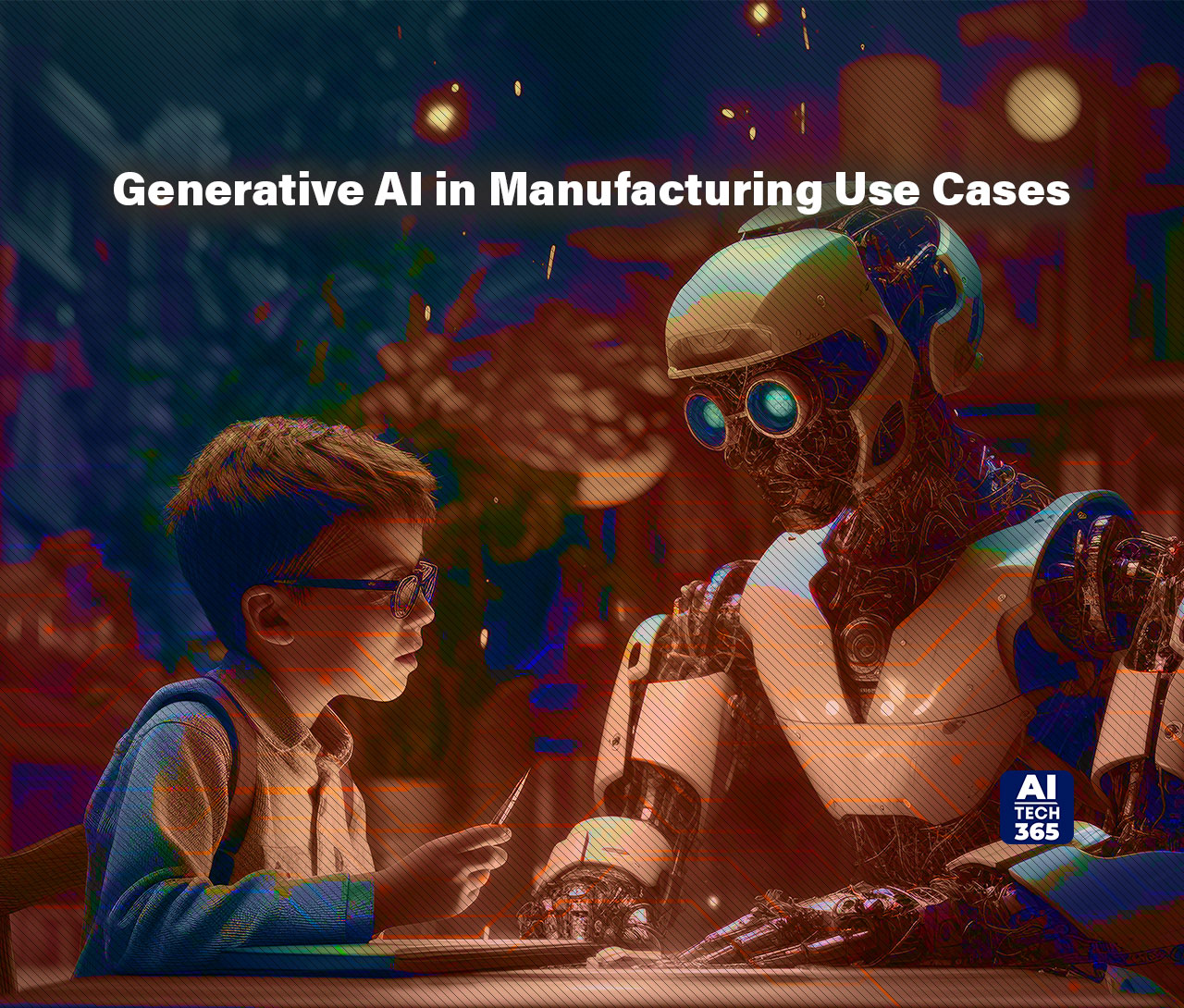The manufacturing industry, from its inception with assembly lines to the current robotics revolution, has always sought innovative methods to enhance productivity while reducing costs. Today, amid ongoing transformations, the integration of generative AI in manufacturing emerges as a pivotal trend.
The industry faces formidable challenges, exacerbated by disruptions in the supply chain that threaten to erode profitability, with an estimated 45% loss in annual earnings projected for the average company over the next decade. Additionally, the persistent struggle to address critical labor shortages looms large, affecting over half (54%) of manufacturers.
These pressing challenges underscore the need for innovative solutions. Generative AI holds immense promise in this regard, capable of revolutionizing maintenance workflows by swiftly identifying and resolving issues in real-time.
What is Generative AI?
Generative AI is an artificial intelligence category that is dedicated to producing fresh data based on the data it has been trained upon, generating an output resembling the structure and content of the initial input it received during training but distinct and original in its particulars.
It finds extensive utility in diverse fields such as natural language processing (NLP), image generation, musical creation, and pharmaceutical research. Additionally, it serves as the fundamental framework for advanced chatbots like OpenAI’s ChatGPT and GPT-4, which produce text resembling human writing through data input.
The utilization of generative AI technology spans across a multitude of industries and corporate operations. A particular sector that stands out is manufacturing. The question then arises: How does it revolutionize the manufacturing industry? Let’s delve deeper to understand its impact.
Benefits of Integrating Generative AI in Manufacturing
● Enhanced efficiency
Generative AI has the capability to streamline multiple stages of the production process, encompassing design tasks and quality assurance procedures. This technology accelerates manufacturing timelines and enhances the overall efficacy of operations.
● Cost savings
Through the utilization of predictive maintenance to predict machinery malfunctions and the improvement of quality control to minimize flaws, generative AI can substantially lower expenses linked to operational halts and inefficiencies in the production procedure.
● Improved innovation
Generative design leverages artificial intelligence to analyze a wide range of design options within specified parameters and limitations, potentially resulting in the development of groundbreaking solutions and products.
● Better decision making
Through its capacity to swiftly and precisely process extensive data sets, generative AI offers crucial insights to enhance strategic decision-making in fields such as production scheduling, inventory control, and supply chain enhancement.
● Reduced downtime
AI-driven predictive maintenance enables the anticipation of machinery failures in advance, empowering manufacturers to conduct essential repairs proactively during planned maintenance windows, effectively averting sudden failures and production losses.
Generative AI in Manufacturing Use Cases
Generative AI in manufacturing, known for its exceptional data processing and comprehension capabilities, presents a versatile solution applicable to various domains beyond enhancing productivity and efficiency. Below are five examples where gen AI plays a pivotal role in revolutionizing the manufacturing sector.
1. Machine-generated events monitoring
Predictive maintenance is considered the most effective approach that detects and addresses potential equipment malfunctions proactively. As per Deloitte, its implementation results in a 25% boost in productivity, a 70% drop in breakdown occurrences, and a 25% decrease in maintenance expenditures.
The integration of generative AI in manufacturing significantly results in altering maintenance processes and proactively addressing maintenance needs. Through analyzing data from machinery and equipment, it enables industry players to streamline operations, minimize unforeseen downtimes, enhance operational effectiveness, and optimize resource utilization.
Furthermore, in the event of an issue detection, generative AI in manufacturing can offer suggestions for resolution alongside service strategies to aid maintenance teams in resolving the matter. The user-friendly interface of this technology allows manufacturing specialists to engage with it through natural language and standard queries, facilitating its adoption among existing staff and prospective hires.
2. Customer service automation
The standard for post-sales support within the manufacturing industry is on the rise. As per findings from Salesforce, a notable 80% of corporate purchasers anticipate real-time responses and engagement from enterprises, while 82% affirm that tailored assistance significantly impacts their loyalty.
To meet these demands, manufacturers are now shifting towards artificial intelligence, particularly gen AI, to enhance customer service by streamlining and expediting the resolution process for common interactions such as product issues, part replacements, service scheduling, product details, and usage assistance.
3. Document search and synthesis
Product and service manuals within the manufacturing industry are often intricate, posing challenges for service technicians in locating crucial information required for repair tasks. Similarly, the processes of ordering and quoting can be intricate as well, requiring sales teams to decode vast amounts of data in order to generate customer quotes.
Integrating generative AI in manufacturing efficiently analyzes extensive archives of documents related to product development, extracting and condensing essential information for sales personnel and technicians.
An example of this capability is its aptitude in presenting repair guidelines in a clear and systematic manner, allowing technicians to commence tasks promptly. Furthermore, it consolidates purchase orders to swiftly generate customer quotations, thereby streamlining the process and eradicating the manual cross-referencing task for sales teams.
4. Product/content catalog discovery
Through the utilization of generative AI in manufacturing, producers acquire a streamlined approach to align demands with the attributes of purchased items and extend a parallel service to their clientele.
Sales applications powered by Gen AI can offer sales suggestions by analyzing historical sales data, current inventory status, master data, and other relevant factors. These recommendations are generated through advanced machine learning algorithms that incorporate continuous or real-time feedback mechanisms to refine and optimize the suggested outcomes. Additionally, these results can be enriched with detailed statistical insights derived from sales data, supplemented by meta-information provided by sales agents. This integrated approach provides a comprehensive view of the purchasing process, enhancing decision-making capabilities.
As per research conducted by Boston Consulting Group, a particular automotive provider implemented genAI technologies, leading to a notable 21% increase in efficiency, alongside achieving a return on investment(ROI) within a span of one to three years in diverse uses.
5. Supply chain advisor
The manufacturing sector is facing notable challenges due to supply chain disruptions, requiring a dual focus on navigating these prolonged disturbances and embracing heightened demands for responsible, ethical, and sustainable material sourcing. Central to this effort is the crucial emphasis on supply chain visibility, considered paramount by supply chain leaders.
Gen AI functions as a consultant for supply chain management, offering enhanced transparency within intricate networks and suggesting the most suitable suppliers according to specific criteria like the bill of materials specifications, availability of raw materials, delivery timelines, and sustainability indicators. Proficient in extracting information from legal and contractual papers through natural language processing, it provides instant feedback on supply chain efficiency to enhance decision-making processes.
The Future of Generative AI in Manufacturing
Undoubtedly, genAI is positioned to revolutionize the manufacturing sector in the coming years. By efficiently analyzing extensive datasets and providing meaningful insights, genAI holds the power to reshape operational methods and foster creativity within the industry. The future prospects for the use cases and impact of genAI in manufacturing appear exceptionally optimistic, with a multitude of advantages and applications currently under investigation.
The adoption of generative AI in manufacturing sector comes with inherent risks and obstacles, typical of embracing novel technologies. Issues such as inaccurate or biased outcomes stemming from inadequate training and validation of algorithms and machine learning models, as well as the possibility of displacing human labor through automation, highlight the significant challenges associated with genAI. Nonetheless, it is crucial to acknowledge that effective mitigation strategies can address these potential concerns.
The genAI holds immense promise to transform the manufacturing sector by offering real-time analytics, streamlining operations, and fostering new ideas. Companies in manufacturing can leverage this innovation to stay ahead in the industry by acknowledging potential risks and adopting strategic approaches.





